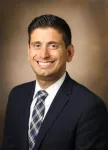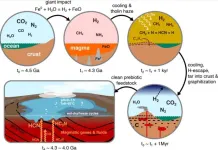(Press-News.org) LA JOLLA (April 18, 2024)—Salk Institute Professor Satchidananda Panda has been named a 2023 Fellow of the American Association for the Advancement of Science (AAAS), the world’s largest general scientific society and publisher of the journal Science. Panda is among 502 new AAAS Fellows spanning 24 scientific disciplines who were nominated by their peers for their distinguished efforts to advance science. The election recognizes his contributions to the field of chronobiology, particularly for applications to obesity and human health.
“The Salk community congratulates Satchin on his well-deserved election as an AAAS Fellow,” says Salk President Gerald Joyce. “His pioneering work in circadian biology has illuminated the intricacies of our body's internal clock and opened new avenues for understanding human health and preventing and managing chronic diseases. We are delighted to celebrate this prestigious recognition with him."
Panda is a professor in the Regulatory Biology Laboratory and holder of the Rita and Richard Atkinson Chair at Salk. He is consistently named among the best and most highly cited researchers in the world by Clarivate. His research explores the genes, molecules, and cells that keep the whole body on the same circadian clock, and how they are linked to health and disease. He has made significant advancements in understanding how light sensors in the eyes measure ambient light levels to regulate the body’s sleep and wake times. These discoveries have fueled a new lighting revolution to reduce blue light exposure at night to improve mood, alertness, and sleep.
In further exploring these daily cycles in the body, his lab’s work has extended into the field of time-restricted eating and its impact on metabolism and immunity. Panda found that mice that eat within a set amount of time (8–12 hours) were slimmer and healthier than those who ate the same number of calories in a larger window of time, showing that when one eats may be as important as what one eats. Subsequent studies have explored whether these benefits of time-restricted eating hold true in humans, with pilot studies suggesting it could have profound impacts on treating high cholesterol, heart disease, diabetes, and obesity. A recent clinical trial in firefighters also showed promising results for improving cardiovascular health in shift workers.
Mice with dysregulated circadian rhythms also had higher levels of inflammation in their bodies than other mice, suggesting that genes and molecules involved in the circadian clock could be potential drug targets for conditions linked to inflammation, such as cancer. Panda’s lab continues to explore the ways that circadian regulation can be used to prevent and better manage these diseases and, in turn, promote healthy aging and extended life spans.
About the Salk Institute for Biological Studies:
Unlocking the secrets of life itself is the driving force behind the Salk Institute. Our team of world-class, award-winning scientists pushes the boundaries of knowledge in areas such as neuroscience, cancer research, aging, immunobiology, plant biology, computational biology, and more. Founded by Jonas Salk, developer of the first safe and effective polio vaccine, the Institute is an independent, nonprofit research organization and architectural landmark: small by choice, intimate by nature, and fearless in the face of any challenge. Learn more at www.salk.edu.
About the American Association for the Advancement of Science:
The American Association for the Advancement of Science (AAAS) was founded in 1848 and includes more than 250 affiliated societies and academies of science, serving 10 million individuals. The nonprofit AAAS is open to all and fulfills its mission to “advance science and serve society” through initiatives in science policy, international programs, science education, public engagement, and more. For additional information about AAAS, see www.aaas.org.
END
Salk Professor Satchin Panda named 2023 AAAS fellow
2024-04-18
ELSE PRESS RELEASES FROM THIS DATE:
New urine test has higher diagnostic accuracy for prostate cancer
2024-04-18
A new urine test that measures 18 genes associated with prostate cancer provides higher accuracy for detecting clinically significant cancers than PSA and other existing biomarker tests, according to a study published April 18 in JAMA Oncology. The urine test, MyProstateScore 2.0 (MPS2), was shown to meaningfully reduce unnecessary prostate biopsies while providing highly accurate detection of worrisome prostate cancers, the researchers concluded.
“In nearly 800 patients with an elevated PSA level, the new test was capable of ruling out the presence of clinically significant prostate cancer with remarkable accuracy. This allows patients to avoid more burdensome and ...
Floating solar’s potential to support sustainable development by addressing climate, water, and energy goals holistically
2024-04-18
Milan, April 17 2024 – The study, published in Nature Energy, is among the first to explore the FPV at the continental scale, finding that FPV installed at existing major reservoirs could produce 20-100% of the electricity expected from Africa’s planned hydropower dams. Using a state-of-the-art energy planning model covering the continent’s entire energy system, the researchers found that FPV is cost-competitive with other renewables and thus a key part of Africa’s future energy mix.
"Floating solar is fast becoming cost-competitive with land-based solar, and ...
Drawing a line back to the origin of life
2024-04-18
Scientists in Cambridge University suggest molecules, vital to the development of life, could have formed from a process known as graphitisation. Once verified in the laboratory, it could allow us to try and recreate plausible conditions for life's emergence.
How did the chemicals required for life get there?
It has long been debated how the seemingly fortuitous conditions for life arose in nature, with many hypothesises reaching dead ends. However, researchers at the University of Cambridge have now modelled how these conditions could occur, producing the necessary ingredients for life in substantial ...
Data-driven music: Converting climate measurements into music
2024-04-18
A geo-environmental scientist from Japan has composed a string quartet using sonified climate data. The 6-minute-long composition—entitled “String Quartet No. 1 “Polar Energy Budget”—is based on over 30 years of satellite-collected climate data from the Arctic and Antarctic and aims to garner attention on how climate is driven by the input and output of energy at the poles. The backstory about how the composition was put together publishes April 18 in the journal iScience as part of a collection “Exploring the Art-Science Connection.”
“I strongly hope that this manuscript marks a significant turning point, transitioning ...
Palaeontology: Discovery of new ancient giant snake in India
2024-04-18
A new ancient species of snake dubbed Vasuki Indicus, which lived around 47 million years ago in the state of Gujarat in India, may have been one of the largest snakes to have ever lived, suggests new research published in Scientific Reports. The new species, which reached an estimated length of between 11 and 15 metres, was part of the now extinct madtsoiidae snake family, but represented a distinct lineage that originated in India.
Debajit Datta and Sunil Bajpai describe a new specimen recovered from the Panandhro Lignite Mine, Kutch, Gujarat State, India, which dates ...
Racial discrimination and metabolic syndrome in young Black adults
2024-04-18
About The Study: The findings of this study with 322 participants suggest that racial discrimination predisposes Black young adults to metabolic syndrome via sleep problems and inflammation, which may serve as actionable targets for prevention in minoritized populations that could reduce existing disparities and promote health equity.
Authors: Nia Heard-Garris, M.D., M.B.A., M.Sc., of the Northwestern University Feinberg School of Medicine in Chicago, is the corresponding author.
To access the embargoed study: Visit our For The Media website at this link https://media.jamanetwork.com/
(doi:10.1001/jamanetworkopen.2024.5288)
Editor’s Note: Please ...
Adherence to American Cancer Society nutrition and physical activity guidelines among cancer survivors
2024-04-18
About The Study: In this cross-sectional study using data from the Behavioral Risk Factor Surveillance System for 10,000 cancer survivors, only 4% of cancer survivors adhered to all four American Cancer Society nutrition and physical activity guidelines, with the mean number of guidelines met being 2.0. Improved understanding of guideline adherence and its determinants may guide oncologists and general internists in providing recommendations for their patients who have completed cancer treatments.
Authors: Kathryn Norman, M.D., of the Beth Israel Deaconess Medical Center in Boston, is the corresponding author.
To access the embargoed study: Visit our For The ...
New urine-based test detects high-grade prostate cancer, helping men avoid unnecessary biopsies
2024-04-18
ANN ARBOR, Michigan — Researchers at the University of Michigan Rogel Cancer Center have developed a new urine-based test that addresses a major problem in prostate cancer: how to separate the slow-growing form of the disease unlikely to cause harm from more aggressive cancer that needs immediate treatment.
The test, called MyProstateScore2.0, or MPS2, looks at 18 different genes linked to high-grade prostate cancer. In multiple tests using urine and tissue samples from men with prostate cancer, it successfully identified cancers ...
Researchers reduce bias in pathology AI algorithms using foundation models
2024-04-18
Findings of substantial variability in pathology AI models’ performance based on race, insurance type and age group serve as a “call to action” to researchers and regulators to improve medical equity
Large foundation models that incorporate a richer level of detail may mitigate disparities between different demographic groups and enhance model accuracy.
Advanced artificial intelligence (AI) systems have shown promise in revolutionalizing the field of pathology through transforming the detection, diagnosis, and treatment of disease; however, the underrepresentation of certain patient populations in pathology ...
Properties of new materials for microchips can now be measured well
2024-04-18
Making ever smaller and more powerful chips requires new ultrathin materials: 2D materials that are only 1 atom thick, or even just a couple of atoms. Think about graphene or ultra-thin silicon membrane for instance. Scientists at TU Delft have taken an important step in application of these materials: they can now measure important thermal properties of ultrathin silicon membranes. A major advantage of their method is that no physical contact needs to be made with the membrane, so pristine properties can ...





